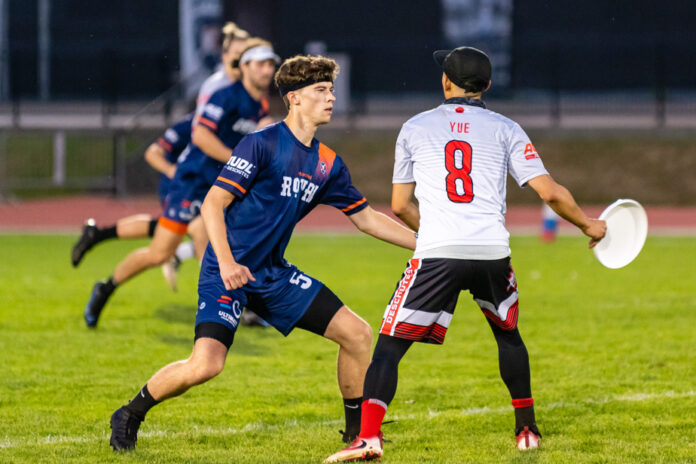It takes guts to become a professional athlete earning just $50 a game. In addition to studying for a Ph.D. in parallel. Yet this is the life chosen by Julien Sénéchal and Calvin Coulbury.
One is from Gaspé. The other from Austin, Texas. But the two play for the Royal of Montreal and have a common passion for ultimate frisbee.
Sénéchal completed his medical studies at the University of Montreal. During our interview, which dates back to mid-July, at the Saint-Henri café in the Villeray district of Montreal, the 23-year-old young man was in the middle of an internship, in externship, in anesthesia.
For his part, Coulbury, proudly wearing his blue and orange number 37 Royal jersey, embarked on a doctorate in ocean and atmospheric science at McGill University to study climate change.
One thing is certain, it is not with their salary as a frisbee player that they will be able to pay their tuition fees. Both players receive $50 per game, the minimum wage allowed by the American Ultimate Disc League (AUDL). However, some teams can pay their players up to $10,000 per year.
Nevertheless, Sénéchal and Coulbury do not necessarily play Frisbee for a living. They play to win. Quite simply.
“For me, even though the salary is low, I still don’t have to pay to play Frisbee, because everything is paid. There is no expense. I can just play and win,” said the Texan.
Over the years, the Royal of Montreal has become the reference in the world of Quebec frisbee. Like the Alouettes in football or CF Montreal in soccer. The team will celebrate its 10th anniversary next year.
Already, she can rely on a base of loyal supporters. At the Claude-Robillard center, the stands are full. And the excitement around the club, and the discipline, is making kids.
According to the 22-year-old, the Royal have two goals. First, perform. “We want to win. We want to put Montreal on the map. Then there is the event component. “We want to create a show, become an event for families, friends and people from all walks of life. The atmosphere at our home games is electric. »
Sénéchal started throwing the disc in his hometown, in Gaspésie, between high school and CEGEP. “It was love at first sight,” says the 23-year-old athlete. The athleticism, team spirit and technique associated with sport convinced him to pursue this path.
Coulbury was also seduced by the Frisbee community as soon as he entered the industry. “My family had never been very involved in the sport, and the frisbee community was really very different from other sports. This is what attracted me and what held me back. »
According to him, “in Quebec, in Canada, the frisbee culture is really more developed among young people than in Texas”. Here he alludes to openness, diversity and accessibility.
“I think if I had a decent salary, I would commit 100%, because I like it too much,” says Sénéchal. Until that day comes, however, he plans to prioritize his medical studies. “It takes some sacrifices, but school remains the priority. »
During his last internship, however, he had to miss a full week due to the U24 World Championships. “A lot of times [teachers] get it because it’s the national team. »
In addition to their weekend game, the Royal players are at the training ground twice a week, in the evenings, and in the weight room three or four times a week.
“Frisbee is a big commitment and I think it shows how serious the Royal is,” Coulbury said.
During the hour that this meeting lasted, all the questions were asked in French, despite the presence of the Texan around the imposing wooden table. Coulbury learned to understand and speak the language of Vigneault in French high school, before arriving in Canada.
That’s why he chose to integrate into the culture here by doing what he knows how to do best: “We do it for the love of the game, for the love of the Royal and we try to build something permanent for Montreal and for Quebec. »















